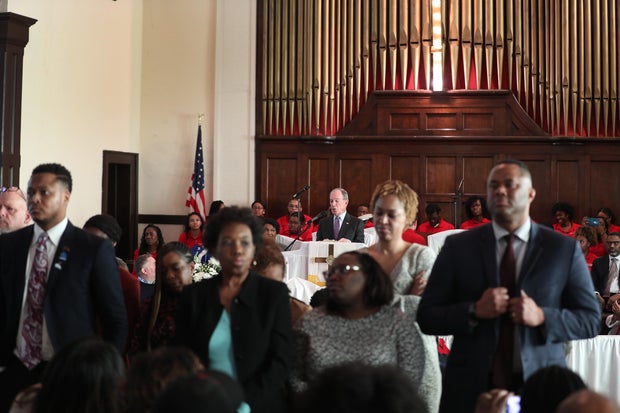Michael Bloomberg’s likability among African-American Democratic voters has been hit a crushing blow Sunday, after congregants at the historic Brown Chapel AME Church in Selma turned their backs on the former New York City mayor.
Bloomberg’s chances among African Americans was severely bruised and dented when he took to the podium to address the Brown Chapel AME Church’s congregants.
Roughly 10 minutes into his speech, several congregants rose from their seats and silently turned away from him, CBS News reported. Bloomberg was speaking about voter suppression and the fight for civil rights.
Bloomberg was at the historic church at the request and invitation of the Reverend Leodis Strong.

“I think that it’s important for Mr. Bloomberg, Mayor Bloomberg, to hear from you, listen to you, to learn from you,” Strong said.
“Let me just say this. I think it’s important that he came,” Strong said. “And it shows a willingness on his part to change. And I like that, and I think that that is important.”
Also at the service at Brown Chapel was former Vice President Joe Biden, who won Saturday’s South Carolina primary, and Stacey Abrams, who unsuccessfully ran for governor of Georgia in 2018.
Bloomberg’s name will for the first time be on the ballot paper on Super Tuesday on March 3. He skipped the first four early-voting states.
As part of Bloomberg’s pitch for the Democratic nomination is his acknowledgment of white privilege and the need for a more equitable America.
“As someone who has been very lucky in life, I often say my story would only have been possible in America, and I think that’s true,” he said during one of his campaign stops in Tulsa, Oklahoma.
“But I also know that my story might have turned out very differently if I had been black and that more black Americans of my generation would have ended up with far more wealth, had they been white,” he said.
He continued that instead, African-Americans have been “excluded from opportunities in housing, in employment, education, and other areas.”
To acknowledge one’s white privilege in a presidential run is a sign of the progress the debate has made in modern American politics. Hitherto, the evils of America’s social engineering on race would have been muted.
This also puts Bloomberg in a more curious position having supported the racially biased policing technique of stop-and-frisk in New York when he was the city’s mayor.
Officers took advantage of what was described as a preemptive measure to target young people of color, usually black, and harassed them.










